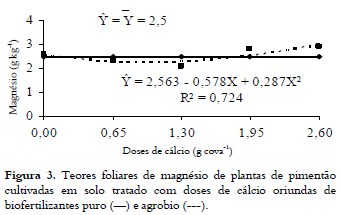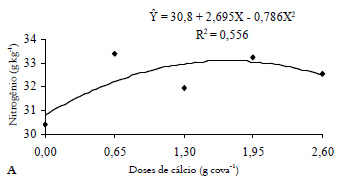Use of liquid biofertilizers is one of the practices of organic agriculture that aims to achieve balanced plant nutrition. As a result, higher yield levels are expected, with no significant cost increases. The aim of this work is to verify the nutritional status of sweet pepper (Capsicum annuum L.) in response to the application of different rates and sources of biofertilizer. The experiment was carried out at Sítio Macaquinhos, in the municipality of Remigio, Paraíba State, Brazil. Treatments were distributed in a 2 × 5 factorial arrangement, representing the two biofertilizer sources and five calcium rates (0; 0.65; 1.30; 1.95 and 2.60 g pit-1 of calcium). Pits were spaced 1 × 0.50 m apart, filled to the top with 2 L of cattle manure and 1 L of vegetable ash. The pure form and agrobio biofertilizers were prepared 30 and 60 days before the sowing date, respectively. In the beginning of the flowering stage, sweet pepper plants were nutritionally deficient in nitrogen, calcium, magnesium, but were balanced in phosphorous, sulfur and potassium. In spite of higher levels of macro and micronutrients in agrobio, it was established at the end of the experiment that the results on plant mineral composition were similar.
Capsicum annuum L.; organic cropping; soil chemical analysis









